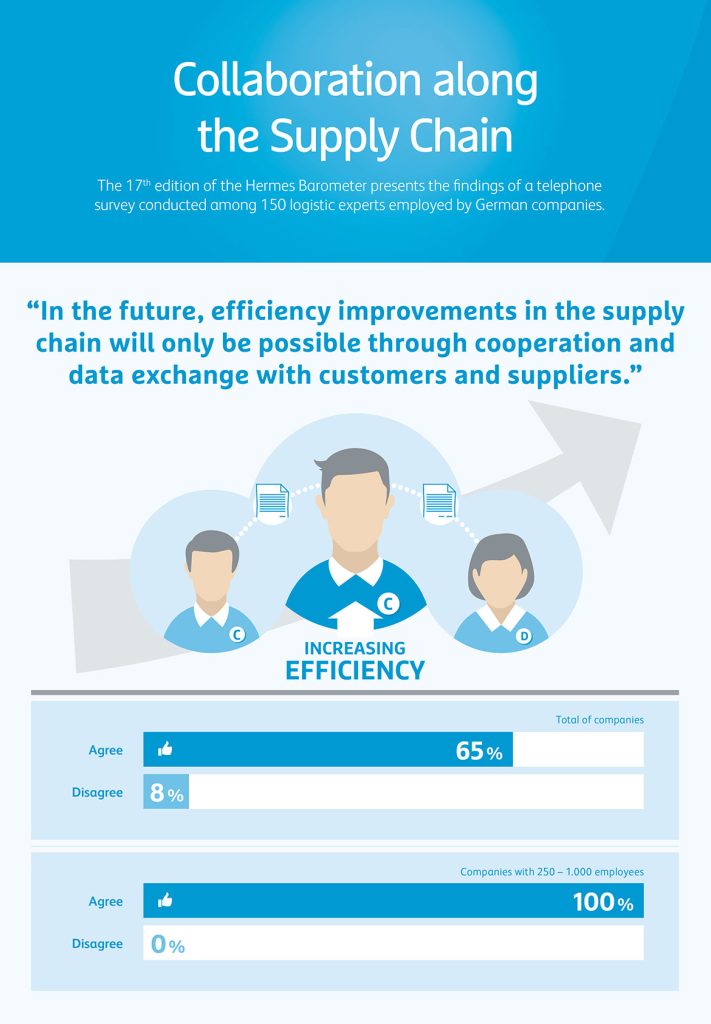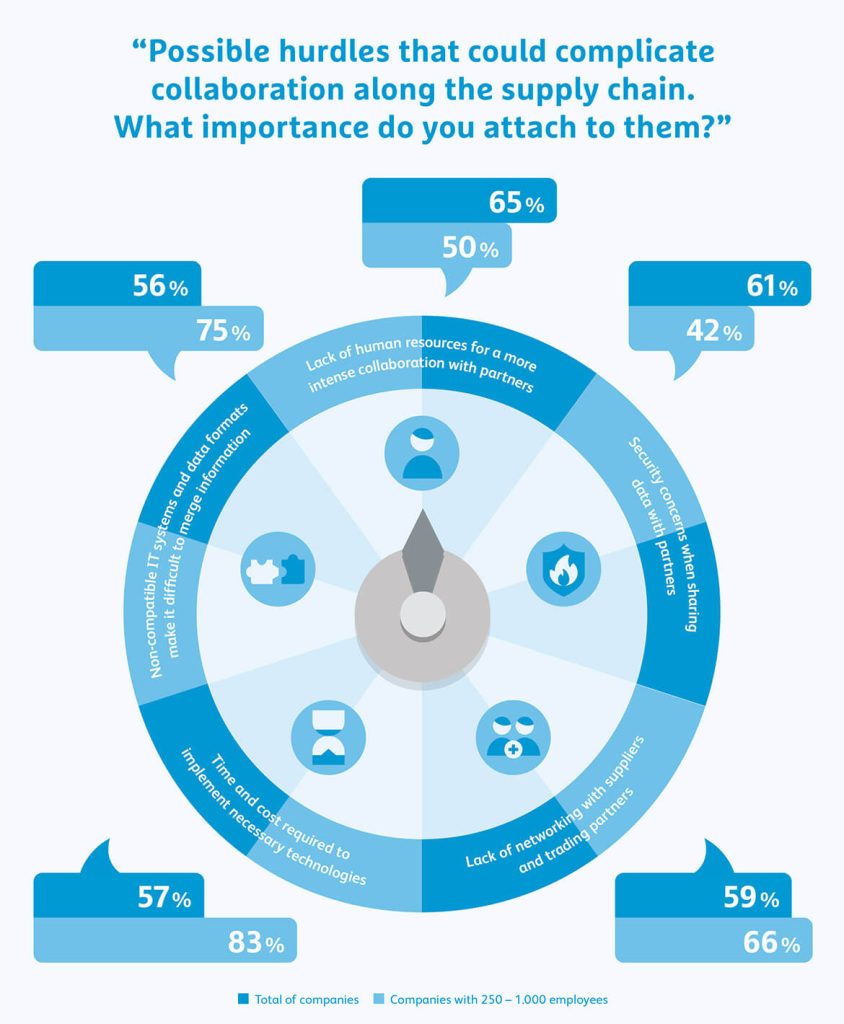Collaboration and data exchange within the supply chain is a decisive factor for German companies that aim to increase the efficiency of procurement processes. This view is held by two-thirds of the total of 150 logistics and supply chain managers surveyed for the 17th Hermes-Barometer on “Collaboration in the Supply Chain”. Factors that promise a better overview within the supply chain, a higher degree of efficiency and more precise coordination of processes are rated as particularly critical to success. However, when it comes to implementation, companies face technological and personnel obstacles. Our recent blog post provides a detailed insight into the results of the survey.
The majority of companies surveyed for the 17th Hermes Barometer have recognized the high potential of cross-company collaboration and operational networking within the supply chain. At 65 percent, well over half of the respondents believe that in the future, efficiency improvements in the supply chain will only be possible through cooperation and data exchange with business customers and suppliers.
In larger companies with 250 to 1,000 employees, as many as 100 percent of respondents share this view. Around seven in ten companies (68 percent) state that they already rely on intensive cooperation with business customers and suppliers in their procurement processes. Across all company sizes, however, around half (55 percent) of the companies admit that they are aware of the potential of collaborative processes but are not yet fully exploiting it.
Decisive for success: communication, networking and digital control
When it comes to the advantages of collaboration, companies particularly mention factors that are associated with good networking across company boundaries.
Almost nine out of ten supply chain managers (88 percent) attach importance to personal contact and exchange between the various partners. For companies with 50 to 250 and 250 to 1,000 employees, 89 and 83 percent of respondents respectively confirm the importance of cross-company communication in the supply chain.
Powerful control tools such as IT platforms for efficient collaboration within the supply chain are rated as critical to success by larger companies with 250 to 1,000 employees in particular (83 percent).
Across all company sizes, 67 percent of respondents agree with the latter. Further, avoiding an unnecessary duplication of activities and leveraging synergies is also perceived as important: Around half of respondents working for companies with 50 to 250 employees confirm this statement compared to 67 percent at companies with 250 to 1,000 employees.
“Transparency is both the prerequisite and the result of collaborative processes – especially when they are digitally supported”


Shared data and information: Transparency as a success factor
Most decision-makers consider the effect of collaborative work on the topic of visibility within the supply chain to be particularly relevant: Three-quarters of respondents believe an increased transparency through a shared view of the supply chain to be critical to success.
Among companies with 250 to 1,000 employees as many as 83 percent confirm this thesis.
“Transparency is both the prerequisite and the result of collaborative processes – especially when they are digitally supported,” explains Moritz Gborglah, Division Manager and digital transformation expert at Hermes International, a division of Hermes Germany. “Sharing data and information enables joint control, and a shared utilization in turn fosters the collection of high-quality data. In this way, collaborative processes can be continuously optimized.”

Barriers: Lack of networking, high costs and few human resources
The positive assessment is offset by numerous technical and organizational obstacles to implementing collaborative approaches. Across all company sizes, more than half of those surveyed (57 percent) see the time and expense involved in implementing the necessary technologies as an obstacle. Companies with 250 to 1,000 employees regard this as a particular hurdle (83 percent).
In this size range, technological challenges also stand in the way of successful implementation, making it more difficult to merge information and data. Three-quarters of respondents cite incompatible IT systems and data formats in this context.
Overall, however, the survey participants rate a lack of personnel resources for intensive cooperation with partners as the most significant obstacle hindering the realization of successful collaboration (65 percent). Other obstacles cited include security concerns when sharing data with other players in the supply chain (61 percent) and a lack of networking with suppliers and trading partners (59 percent). “SMEs in particular often lack the internal expertise and sufficient staff capacity to cope with the diverse requirements of collaborative networking.
In this context, external support can assist in order to enable or accelerate implementation,” says Moritz Gborglah.
“Modern and technology-based supply chain management can make a significant contribution to increasing transparency along the entire supply chain”
Technologies: Platforms and cloud solutions as tools for networking
The respondents attribute high effectiveness for cooperation within the supply chain to digital technologies that serve to simplify the exchange of information and data between different actors.
The potential of networking systems is rated very highly, especially among companies with 250 to 1,000 employees. Almost all of the respondents (91 percent) in this group say that digital platforms are important for monitoring internal and external supply chain data.
At 92 percent, the use of cloud computing and platform solutions achieved an almost identical result. Further, the importance of ERP systems was emphasized by 83 percent.
74 percent of all companies surveyed would like their logistics service providers to offer digital solutions in order to increase supply chain transparency.
Moritz Gborglah sees great potential in this form of collaboration: “Modern and technology-based supply chain management can make a significant contribution to increasing transparency along the entire supply chain and thus enable greater cooperation between partners. By providing cloud and platform solutions, logistics experts like Hermes Germany are helping companies to remove barriers and harness the full power of collaboration within the supply chain.”


